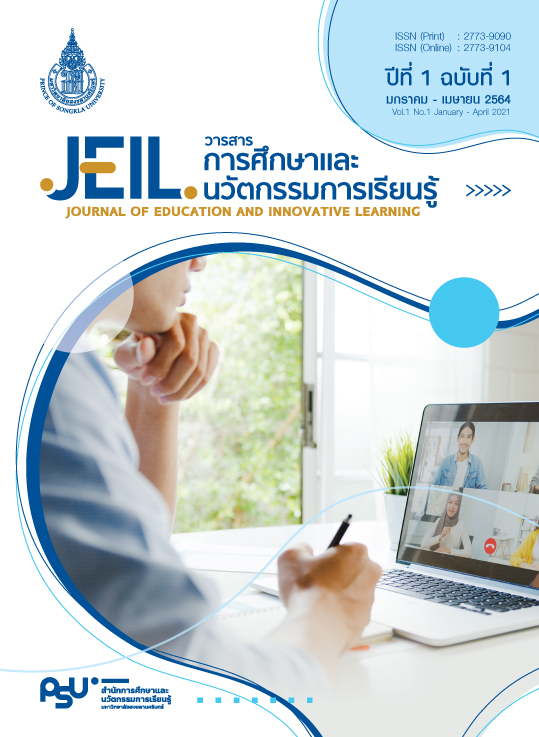การออกแบบการจัดการเรียนรู้เชิงรุกโดยใช้รูปแบบการเรียนการสอนด้วยโครงการเป็นฐานเพื่อบริการวิชาการสังคม กรณีศึกษา โครงการรณรงค์ทางการสื่อสารการตลาดเชิงบูรณาการ เพื่อสนับสนุนการดำเนินงานของสภากาชาดไทย
Main Article Content
บทคัดย่อ
บทความนี้ มีวัตถุประสงค์เพื่อนำเสนอผลการศึกษาการออกแบบการจัดการเรียนรู้เชิงรุก ผลสัมฤทธิ์ทางการเรียนและความพึงพอใจของผู้เรียนต่อการจัดการเรียนรู้เชิงรุกโดยใช้รูปแบบ การเรียนการสอนด้วยโครงการเป็นฐานเพื่อบริการวิชาการสังคม กรณีศึกษา “โครงการรณรงค์ทาง การสื่อสารการตลาดเชิงบูรณาการ เพื่อสนับสนุนการดำเนินงานของสภากาชาดไทย” วิชาการสื่อสารการตลาดเชิงบูรณาการของนักศึกษา ชั้นปีที่ 2 จำนวน 111 คน ภาคการศึกษา 2/2560 คณะนิเทศศาสตร์ มหาวิทยาลัยธุรกิจบัณฑิตย์ ใช้วิธีการถอดบทเรียนตามกรอบกระบวนการพัฒนาคุณภาพวงจรเดมมิ่ง 4 ขั้นตอน คือ การวางแผน การปฏิบัติตามแผน การตรวจสอบผลการปฏิบัติ และการปรับปรุงแก้ไข ตามสภาพจริงทุกขั้นตอน
ผลการวิจัยพบว่า การออกแบบการจัดการเรียนรู้เชิงรุกโดยใช้รูปแบบการเรียนการสอนด้วยโครงการเป็นฐานเพื่อบริการวิชาการสังคมครั้งนี้ มี 4 วิธี คือ 1) การใช้โจทย์งานจริงจากความต้องการขององค์กรให้ผู้เรียนได้ลงมือทำ 2) การใช้กระบวนการกลุ่ม 3) ผู้สอนสอนน้อยลงและให้ผู้เรียนได้เรียนรู้ด้วยตนเองมากขึ้น และ 4) การเปลี่ยนบทบาทของผู้สอนมาเป็นผู้ช่วยเหลือ ทั้ง 4 วิธีนี้ ส่งผลสัมฤทธิ์ทางการเรียนของผู้เรียนในทางบวก และผู้เรียนมีความพึงพอใจต่อการสอนภาพรวม อยู่ในระดับมากที่สุดทุกข้อ สะท้อนความสำเร็จของการออกแบบการจัดการเรียนรู้เชิงรุกสอน ซึ่งผู้สอนในรายวิชาและคณะอื่น ๆ สามารถนำไปประยุกต์ใช้ให้เกิดประโยชน์ตามความเหมาะสมกับผู้เรียน เนื้อหารายวิชาและบริบทของชั้นเรียนได้
Article Details

อนุญาตภายใต้เงื่อนไข Creative Commons Attribution-NonCommercial-NoDerivatives 4.0 International License.
เนื้อหาและข้อมูลในบทความที่ตีพิมพ์ในวารสารการศึกษาและนวัตกรรมการเรียนรู้ ถือเป็นข้อคิดเห็นและความรับผิดชอบของผู้เขียน ซึ่งกองบรรณาธิการวารสาร ไม่จำเป็นต้องเห็นด้วยหรือร่วมรับผิดชอบใด ๆ และไม่สงวนสิทธิ์การคัดลอกบทความเพื่อใช้ประโยชน์ทางวิชาการ แต่ให้อ้างอิงข้อมูลแสดงที่มาของบทความทุกครั้งที่นำไปใช้ประโยชน์
เอกสารอ้างอิง
Angganapattarkajorn, V. (2012). Application of teach less, learn more to learning management in mathematics classroom. Journal of Education, 23(1), 1-11. [in Thai]
Bodeerat, C. (2016). Development of an extrovert behavior by employing group process to acquire learning achievement on public human resource management and development. Journal of Community Development Research (Humanities and Social Sciences), 9(3), 67-72. [in Thai]
Duangprakes N., Susoarat P., & Kasemnet L. (2017). Problem-based active learning model on non-formal education students’ academic competence. Journal of Education, 18(2), 209-224. [in Thai]
Division of Medical Education. (2016). PSU with active learning. PSU Medical Education Newsletter, 2(1), 1. [in Thai]
Indarit, B. (2013). The behavior learning of undergraduate study under active learning concept in management of agriculture occupation, Bachelor of Education Agriculture, Chiang Mai University. Journal of Humanities and Social Sciences University of Phayao, 1(3), 12-16. Retrieved from https://so03.tci-thaijo.org/index.php/Humanties-up/article/view/42709 [in Thai]
Insook S., Atchariyasakchai A., & Imthab R. (2016, June). Active learning instructions in biochemistry for Thailand qualification framework for higher education at boromarajonani college of nursing buddhachinaraj. In Assoc. Prof. Dr. Wipas Thongsut (Chair), The national conference & research presentation toward the second decade: Sustainability knowledgement on research integration, Research and Development Office, Nakhon Ratchasima College, Thailand. [in Thai]
Kwankaew P., Vanichvasin P., & Siripipattanakoon S. (2016). Development of creative characteristics using project-based learning (PjBL) for high vocational students of program in secretarial. Journal of Southern Technology, 9(1), 1-6. Retrieved from https://so04.tci-thaijo.org/index.php/journal_sct/article/view/82404 [in Thai]
Na nakorn, S. (2014). Guidelines of cultivating moral and social responsibility through community academic service. Journal of Moral and Virtue, 2(1), 10-26. [in Thai]
______________. (2020, May). Integrated learning management courses across grade through project-based learning. In Assoc. Prof. Dr. Krisana Rungrojwanich (Chair), The national conference & research presentation, stou research in collaboration with phachachuen research network: A study conducted to be in line with the government’s national strategy, Research and Development Institute, Sukhothai Thammathirat Open University, Thailand. [in Thai]
Pongpool, C. (2014). Application of teach less, learn more in the field of teaching in the department of food science and technology. Retrieved from http://apr.nsru.ac.th/Act_learn/myfile/09062014173434_3.pdf [in Thai]
Prompasit, P. (2015). Knowledge management: Guidelines for active learning management of Faculty of Humanities and Social Sciences Kamphaengphet Rajabhat University. In Prompasit, P., Active Learning (AL) for Huso at KPRU (p. 9). Retrieved from https://huso.kpru.ac.th/File/Academic/KMBBOOK-58.pdf [in Thai]
Prontadavit, N. (2016). Active Learning (pp. 19-28). Bangkok: Triple Education.
________________. (2017). Development of active learning in learning management subject. Rajamangala University of Technology Krungthep RESEARCH JOURNAL, 11(1), 85-94. [in Thai]
Rajamangala University of Technology Lanna Pitsanulok. (2020). Active learning-based knowledge management for developing active graduates. Retrieved from https://webs.rmutl.ac.th › upload › files › 2020/09 [in Thai]
Sawangsri, B. (2016). Effects of teaching mathematics by active learning to promote achievement (Research report). Ayutthaya: Rajamangala University of Technology Suvarnabhumi. [in Thai]
Srimatyakun, N. (2014). The effects of using techniques in small groups on achievement and satisfaction of students in DES111 visual Art in Department of Digital Arts, Faculty Digital Media, Sripatum University (Research report). Bangkok: Sripatum University. [in Thai]
Sompuet, P. (2016). Organized active learning by instructional model with case-based. Phranakhon Rajabhat Research Journal (Humanities and Social Sciences), 11(2), 260-270. [in Thai]
Talengsri, A. (2014). Learn-Unlearn-Relearn: Continuous Learning Strategy to realize the full potential of leaders. Retrieved from https://thaipublica.org/2014/09/apm-1-learn-unlearn-relearn [in Thai]
The Siam Commercial Foundation. (2011). OHEC support in education reform with the aim of creating quality and responsible graduates. Retrieved from http://www.scbfoundation.com/news [in Thai]
Thongking, P. (2020). The teacher’s role and creating a positive learning environment in the 21st century classroom. CMU Journal of Education, 4(1), 50-59. [in Thai]


